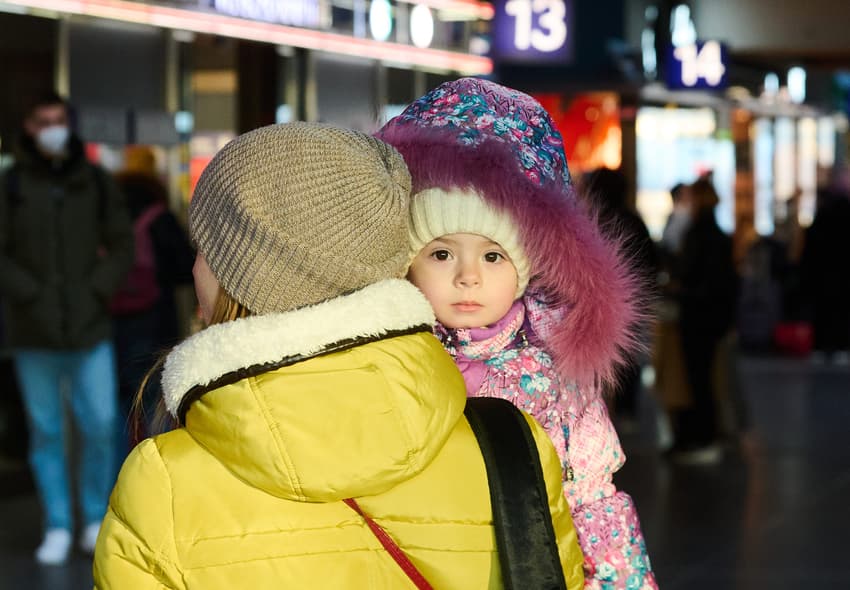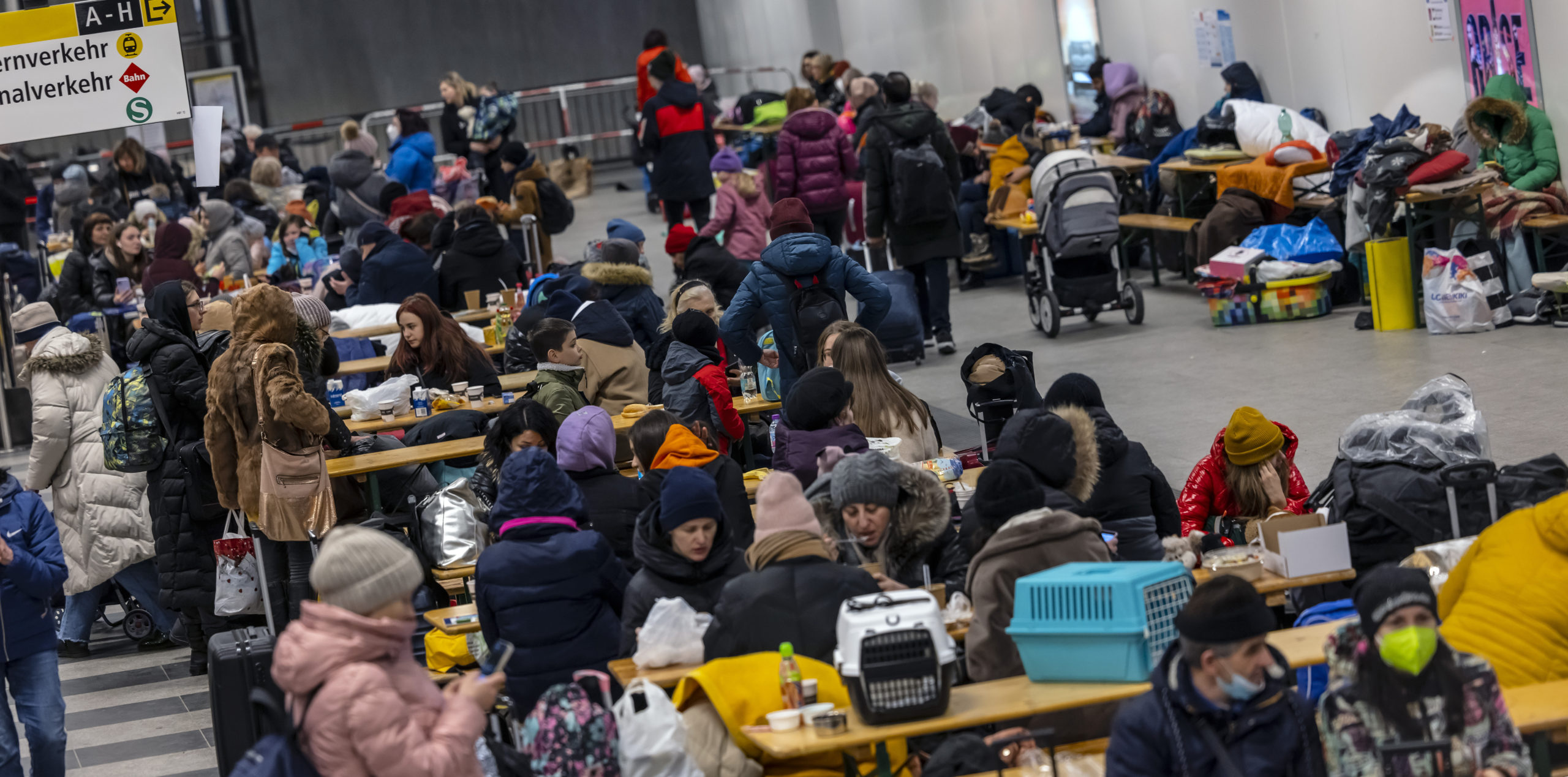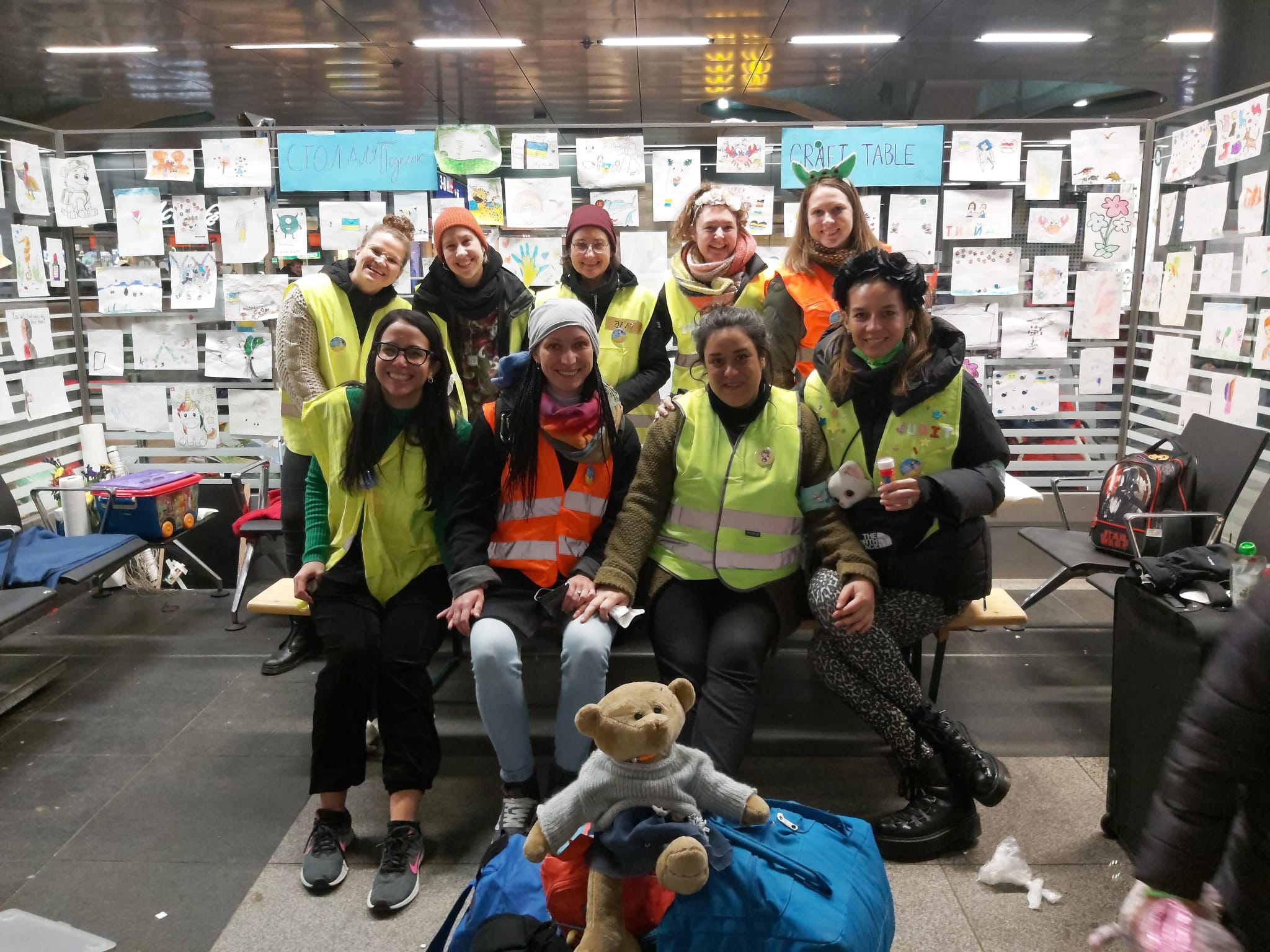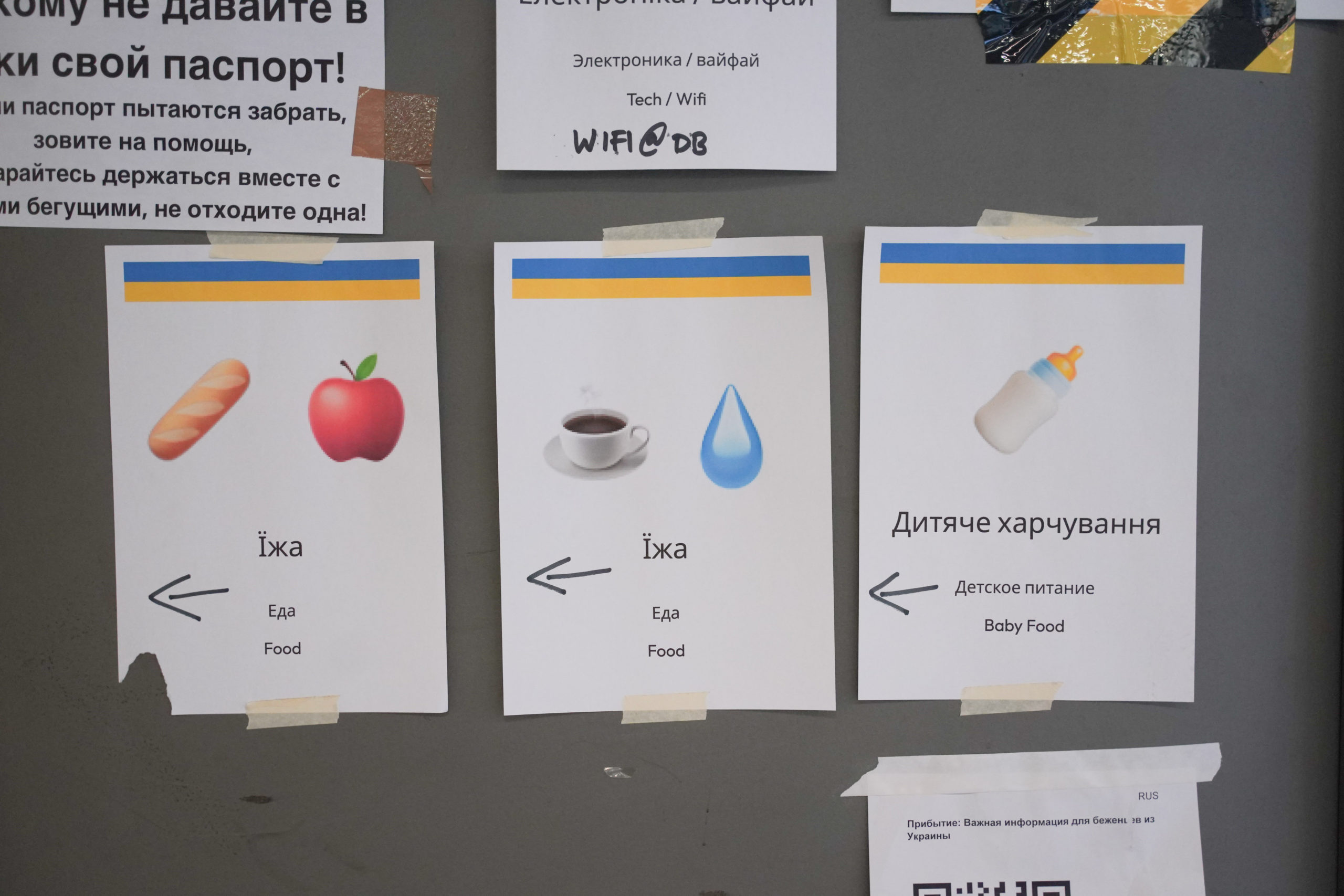'It feels like a dream': The Ukrainian refugees arriving in Berlin from war zone

With Russia's attacks on Ukraine intensifying, millions of people have had to flee their homes, with many seeking refuge in Germany. Tamsin Paternoster met some of them - and the volunteers providing support - at Berlin's main station.
Berlin Hauptbanhof is one of Europe’s biggest train stations but normally quietens down after 10pm when all shops have shut, trains are less frequent and only the 24/7 McDonalds is still accepting customers. Since February 25th however - the day after Russia invaded Ukraine - the station has gradually transformed as a greeting point for tens of thousands of people who have been forced to leave their homes and livelihoods to find refuge in Germany and beyond.
They include Anna, a 29-year-old who works in marketing and is from just outside Kyiv. She had been travelling for two days before arrival at the station. First to Lviv in western Ukraine and finally to Berlin on a train through Poland.
“These monsters came to our house on the third day of the invasion, I live 15 minutes from Kyiv," says Anna, describing the invasion. Like many others, Anna's family rushed to save whatever they could before leaving - including their pets. "We also took our animals, two cats and one dog, they are super stressed right now, especially the cats who are used to being at home," she says.
'Anxious about everything'
Taking an escalator down to the underground floor of the station there is a bustle of activity. On the board behind a makeshift ‘Information’ hub, 10 volunteers, wearing high-visibility jackets with signs stuck on with tape that read: ‘Ger/Eng’ or ‘Ukr/Rus’ - indicating the languages they speak - are frantically taking people’s questions.

People who have fled Ukraine after the Russian invasion sit in Berlin main station. Photo: picture alliance/dpa | Michael Hanschke
Volunteers that speak Ukrainian or Russian are the most in demand, with German and English speakers repeatedly getting turned away or told to come back later. One volunteer named Anya, a 23-year-old student studying in Berlin says: “I’m half Ukrainian and half Russian, half of my family now are in Kharkiv, and I’m really, really anxious about everything. I thought it would be better than checking news and being worried to just come here and help.”
READ ALSO: How people in Germany can support Ukraine
On a board behind them, the train times are scribbled in blue ink: 23.20 from Prague, 22.10 from Warsaw. A volunteer with a megaphone stands up and announces to the groups of volunteers: “Okay, there is a train arriving in twenty minutes, I need eight people.”
The volunteers help carry the bags of those arriving, who are often exhausted and disorientated, and guide them to the main information point. They are then re-directed to stalls containing supplies for children, information on their next train, free cat food and dog kennels, a Covid- 19 testing centre and a large food and drink hall.
Cardboard signs have been taped up around this makeshift welcome centre, offering translations and directions for those arriving. Most are women with children of all ages: multiple toddlers are scattered around taking advantage of sweets offered to them by volunteers, a group of teenage boys are charging their phones in preparation for more rounds of online games.
Tamara Cycman, a 37-year-old freelance designer who has lived in Berlin since 2014 helped set up a ‘kids corner’.
“I wanted to help give the children arriving something to do, so I got a trolley full of old papers and pencils and watercolours that I had," she says. "We just sat down and told passing children and their mothers who were standing if they wanted to come and draw with us while they were waiting. It escalated quickly.”

Volunteers from Berlin set up a kids corner in the station for refugees. Photo: Tamsin Paternoster
Cycman, who has been volunteering since late February, commented that she had noticed two trends as the war went on. “One is that there are a lot more people, and refugee centres in Berlin are already full," she says. "Another trend is that the more time is passing, the worse the state of the people who are arriving. They look, obviously, a lot more tired, and they have been travelling for much longer or left scary situations behind as the conflict gets worse.”
Two weeks ago, Berlin recorded 1,300 refugees arriving by train. At the weekend the Berlin Senate Department for Integration, Labour and Social Affairs recorded an estimated 5,200 people arrivals from Ukraine into central station, with 9,000 arriving last Wednesday alone.
It's hard to determine exactly how many people have arrived. Under normal circumstances, Ukrainians are allowed to enter Germany without a visa for up to 90 days. However, EU countries have already agreed to apply a special rule that lifts visa rules and eases the process. After registering as a war refugee, people are entitled to support but may be transferred from Berlin to another state in Germany.
It is clear that governments are overwhelmed. “Berlin can’t do it alone,” the capital's mayor Franziska Giffey said last weekend. Readers of The Local have also reported confusion and difficulty in finding resources and information from authorities.
A spokesperson for the Berlin Senate told The Local: “No one can tell you the exact number of Ukrainian war refugees, only those who have been accommodated by the State Office for Refugee Affairs (LAF), because many also arrive at the main railway station and then travel on.
"Berlin accommodated 900 people on Wednesday. A total of 8,900 people have accommodation in Berlin.” On Sunday, 1,000 people were accommodated by the LAF in Berlin.
READ ALSO: How is Germany supporting refugees from Ukraine?
The federal police say an estimated 109,183 refugees from Ukraine have arrived in Germany since Russia invaded the country.
In terms of numbers, the amount of people arriving from the war zone has the potential to exceed the last time Berlin’s volunteers rallied around a similar crisis: in the summers of 2015. At its peak, after repurposing Berlin’s Tempelhof airport to accommodate people arriving, the local government struggled to house the 600 to 700 refugees arriving daily leading to tension between Berlin City Hall and individual districts over the use of local sports halls as shelter.
'All my stuff is gone'
At the station, many people arriving in Berlin have been taking trains to other parts of Germany or Europe. German train provider Deutsche Bahn has offered a ‘helpukraine’ tickets, making travel for Ukrainian people free across Germany.

Signs directing refugees from Ukraine to supplies in Berlin main station. Photo: picture alliance/dpa | Jörg Carstensen
Those who want to stay in Berlin are directed to the arrival centre at Oranienburger Strasse 285 where they are offered a room and meals while they wait to be granted a residence permit. Others have taken advantage of people offering private accommodation on platforms such as Unterkunft-Ukraine.de, which has offered 307,240 beds across Germany since the start of the crisis. Until a few days ago, Berliners were showing up at the station with signs and being matched on the spot with people arriving off trains. Volunteers cite safety concerns for refugees as a reason why this was stopped.
Requests for accommodation, donations and general organisation pop up on a Telegram channel titled ‘Ukraine-Berlin Arrival Support’. The channel is just one of many, and as of Friday last week had 13,509 members. It is a near constant buzz of information, with repeated notifications for volunteers to be on the lookout for potential human traffickers or suspicious people. An increase in police officers and private detectives patrolling the area has occurred in recent days.
READ ALSO: 'Could have been us': Why British-German couple took in Ukrainian refugees
“I am waiting until 9am, I will stay here overnight. My train to Stockholm leaves in the morning and I will go join my friends there.” says 27-year-old Maria from Kyiv wearing pink boots and a matching jacket, sitting on one of the station’s hard benches with headphones to block out the noise. She had left Kyiv two days ago.
Maria is not alone. As nighttime arrives and the flurry of volunteers winds down, groups of people with children of all ages and pets of all kinds sit down in small groups, preparing for a cold night in the station before another train takes them all across Europe to join friends, distant relatives or strangers. Volunteers have appealed to Deutsche Bahn to make the station warmer, but have been rebutted by claims that this would be a fire hazard.
Anna is still waiting, trying to figure out her next steps. She tells me: “I had a perfect life, and a perfect job and now everything is broken. I have one hoodie with me, all my stuff is at home. Right now, it’s not like reality, it feels like a dream.”
Comments
See Also
Berlin Hauptbanhof is one of Europe’s biggest train stations but normally quietens down after 10pm when all shops have shut, trains are less frequent and only the 24/7 McDonalds is still accepting customers. Since February 25th however - the day after Russia invaded Ukraine - the station has gradually transformed as a greeting point for tens of thousands of people who have been forced to leave their homes and livelihoods to find refuge in Germany and beyond.
They include Anna, a 29-year-old who works in marketing and is from just outside Kyiv. She had been travelling for two days before arrival at the station. First to Lviv in western Ukraine and finally to Berlin on a train through Poland.
“These monsters came to our house on the third day of the invasion, I live 15 minutes from Kyiv," says Anna, describing the invasion. Like many others, Anna's family rushed to save whatever they could before leaving - including their pets. "We also took our animals, two cats and one dog, they are super stressed right now, especially the cats who are used to being at home," she says.
'Anxious about everything'
Taking an escalator down to the underground floor of the station there is a bustle of activity. On the board behind a makeshift ‘Information’ hub, 10 volunteers, wearing high-visibility jackets with signs stuck on with tape that read: ‘Ger/Eng’ or ‘Ukr/Rus’ - indicating the languages they speak - are frantically taking people’s questions.

Volunteers that speak Ukrainian or Russian are the most in demand, with German and English speakers repeatedly getting turned away or told to come back later. One volunteer named Anya, a 23-year-old student studying in Berlin says: “I’m half Ukrainian and half Russian, half of my family now are in Kharkiv, and I’m really, really anxious about everything. I thought it would be better than checking news and being worried to just come here and help.”
READ ALSO: How people in Germany can support Ukraine
On a board behind them, the train times are scribbled in blue ink: 23.20 from Prague, 22.10 from Warsaw. A volunteer with a megaphone stands up and announces to the groups of volunteers: “Okay, there is a train arriving in twenty minutes, I need eight people.”
The volunteers help carry the bags of those arriving, who are often exhausted and disorientated, and guide them to the main information point. They are then re-directed to stalls containing supplies for children, information on their next train, free cat food and dog kennels, a Covid- 19 testing centre and a large food and drink hall.
Cardboard signs have been taped up around this makeshift welcome centre, offering translations and directions for those arriving. Most are women with children of all ages: multiple toddlers are scattered around taking advantage of sweets offered to them by volunteers, a group of teenage boys are charging their phones in preparation for more rounds of online games.
Tamara Cycman, a 37-year-old freelance designer who has lived in Berlin since 2014 helped set up a ‘kids corner’.
“I wanted to help give the children arriving something to do, so I got a trolley full of old papers and pencils and watercolours that I had," she says. "We just sat down and told passing children and their mothers who were standing if they wanted to come and draw with us while they were waiting. It escalated quickly.”

Cycman, who has been volunteering since late February, commented that she had noticed two trends as the war went on. “One is that there are a lot more people, and refugee centres in Berlin are already full," she says. "Another trend is that the more time is passing, the worse the state of the people who are arriving. They look, obviously, a lot more tired, and they have been travelling for much longer or left scary situations behind as the conflict gets worse.”
Two weeks ago, Berlin recorded 1,300 refugees arriving by train. At the weekend the Berlin Senate Department for Integration, Labour and Social Affairs recorded an estimated 5,200 people arrivals from Ukraine into central station, with 9,000 arriving last Wednesday alone.
It's hard to determine exactly how many people have arrived. Under normal circumstances, Ukrainians are allowed to enter Germany without a visa for up to 90 days. However, EU countries have already agreed to apply a special rule that lifts visa rules and eases the process. After registering as a war refugee, people are entitled to support but may be transferred from Berlin to another state in Germany.
It is clear that governments are overwhelmed. “Berlin can’t do it alone,” the capital's mayor Franziska Giffey said last weekend. Readers of The Local have also reported confusion and difficulty in finding resources and information from authorities.
A spokesperson for the Berlin Senate told The Local: “No one can tell you the exact number of Ukrainian war refugees, only those who have been accommodated by the State Office for Refugee Affairs (LAF), because many also arrive at the main railway station and then travel on.
"Berlin accommodated 900 people on Wednesday. A total of 8,900 people have accommodation in Berlin.” On Sunday, 1,000 people were accommodated by the LAF in Berlin.
READ ALSO: How is Germany supporting refugees from Ukraine?
The federal police say an estimated 109,183 refugees from Ukraine have arrived in Germany since Russia invaded the country.
In terms of numbers, the amount of people arriving from the war zone has the potential to exceed the last time Berlin’s volunteers rallied around a similar crisis: in the summers of 2015. At its peak, after repurposing Berlin’s Tempelhof airport to accommodate people arriving, the local government struggled to house the 600 to 700 refugees arriving daily leading to tension between Berlin City Hall and individual districts over the use of local sports halls as shelter.
'All my stuff is gone'
At the station, many people arriving in Berlin have been taking trains to other parts of Germany or Europe. German train provider Deutsche Bahn has offered a ‘helpukraine’ tickets, making travel for Ukrainian people free across Germany.

Those who want to stay in Berlin are directed to the arrival centre at Oranienburger Strasse 285 where they are offered a room and meals while they wait to be granted a residence permit. Others have taken advantage of people offering private accommodation on platforms such as Unterkunft-Ukraine.de, which has offered 307,240 beds across Germany since the start of the crisis. Until a few days ago, Berliners were showing up at the station with signs and being matched on the spot with people arriving off trains. Volunteers cite safety concerns for refugees as a reason why this was stopped.
Requests for accommodation, donations and general organisation pop up on a Telegram channel titled ‘Ukraine-Berlin Arrival Support’. The channel is just one of many, and as of Friday last week had 13,509 members. It is a near constant buzz of information, with repeated notifications for volunteers to be on the lookout for potential human traffickers or suspicious people. An increase in police officers and private detectives patrolling the area has occurred in recent days.
READ ALSO: 'Could have been us': Why British-German couple took in Ukrainian refugees
“I am waiting until 9am, I will stay here overnight. My train to Stockholm leaves in the morning and I will go join my friends there.” says 27-year-old Maria from Kyiv wearing pink boots and a matching jacket, sitting on one of the station’s hard benches with headphones to block out the noise. She had left Kyiv two days ago.
Maria is not alone. As nighttime arrives and the flurry of volunteers winds down, groups of people with children of all ages and pets of all kinds sit down in small groups, preparing for a cold night in the station before another train takes them all across Europe to join friends, distant relatives or strangers. Volunteers have appealed to Deutsche Bahn to make the station warmer, but have been rebutted by claims that this would be a fire hazard.
Anna is still waiting, trying to figure out her next steps. She tells me: “I had a perfect life, and a perfect job and now everything is broken. I have one hoodie with me, all my stuff is at home. Right now, it’s not like reality, it feels like a dream.”
Join the conversation in our comments section below. Share your own views and experience and if you have a question or suggestion for our journalists then email us at [email protected].
Please keep comments civil, constructive and on topic – and make sure to read our terms of use before getting involved.
Please log in here to leave a comment.